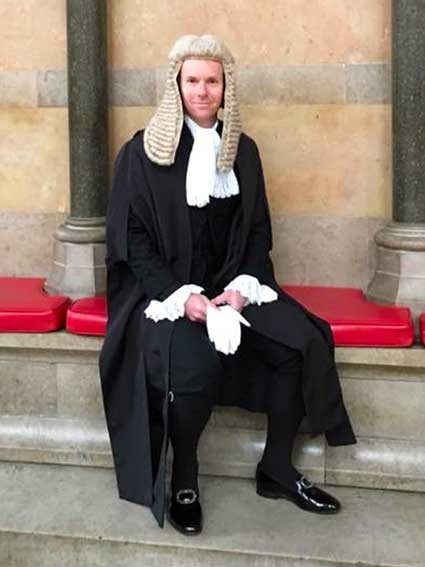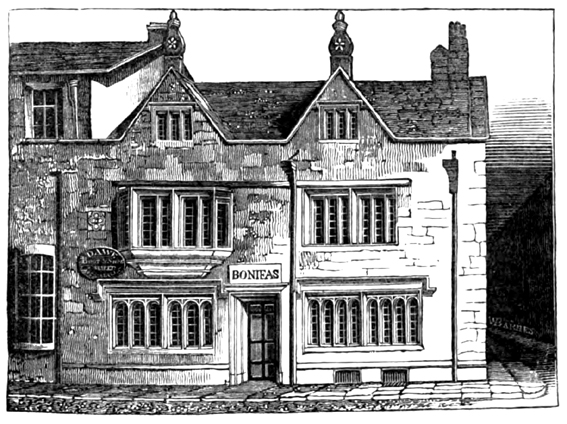Barnes, Hardy and the Law - “But still thiese laes da seem a little tight”
Jim Potts
From Eclogue: Rusticus Res Poliicas Animadvertens, The New Poor Laws
John and Thomas:
JOHN
Well, what d'ye think o' thiese new laes they got
A miade about the parishes an' poor?
THOMAS
Why I da hardly know, I'm sure,
Whether tha'l do the naytion good or not.
But I da hope, drough GOD, the workhouse laes
Wull miake but little odds to I.
I hope to kip myzelf till I da die,
An' miake my own han's always veed my jaes.
I aleways scarn'd as I da hope to scarn
To ax var money that I diden yarn.
William Barnes may not have been as involved in matters of the law, trials and legal cases as Thomas Hardy was, but he was certainly sensitive to issues of justice and injustice and interested in the principles of punishment. On the whole he believed in the importance of goodwill between landowners and agricultural labourers, rather than in unionisation. He was opposed to the Act against squatting on commons, which was later repealed. He writes in Dorset Folk and Dorset (The Leisure Hour, 1883/1884) about the case of Thomas Whitcher, of Holt, Dorset, who was indicted under the Act to “transportation for seven years, or to enlist in the forces by sea or by land” (Barnes was quoting from the Dorset County Records).
In 1871 he published “On the Origin of the Hundred and Tithings of English Law”, which he had read before the British Archaeological Association at Weymouth. It was printed in their Transactions.
Thomas Hardy was a Justice of the Peace for thirty years, and he took various oaths of allegiance.

I was reminded of these and other formalities when I attended (as a guest) the Queen’s Counsel Declaration Ceremony in Westminster Hall when my son received his Letter Patent of appointment as a QC in February 2018, after making his solemn declaration:
“I….do sincerely promise and declare that I will well and truly serve Her Majesty Queen Elizabeth II and all whom I may lawfully be called upon to serve in the office of one of Her Majesty’s Counsel learned in the Law according to the best of my skill and understanding.”
“It was not till the middle of Wednesday that his gown and grey wig, curled in tiers, in the best fashion of Assyrian bas-reliefs, were seen blowing and bobbing behind him as he hastily walked up the High Street from his lodgings…the dim religious nave of the Law Courts”. Thomas Hardy, On the Western Circuit1
Edward C. Sampson on Thomas Hardy – Justice of the Peace (Colby Quarterly, vol.13. Issue 4, December 1977):
“He served as Justice of the Peace for the Borough of Dorchester from 1884, and for the County of Dorset from 1894, sat in court at least thirty-eight times as a magistrate and served at least sixteen times on grand juries for the Assizes. He qualified on 4 April 1884 as borough Justice of the Peace (or borough magistrate, the terms are practically interchangeable).
Hardy “had to take an Oath of Allegiance and a Judicial Oath- this he did on 23 August 1884. The oaths (now in the Dorchester Town Council office) read as follows: "Oath of Allegiance. I, Thomas Hardy --- do swear that I will well and truly serve Our Sovereign Lady the Queen Victoria in the Office of Justice of the Peace for the Borough of Dorchester, in the County of Dorset, and I will do Right to all manner of People after the Laws and Usages of this Realm without Fear or Favour, Affection or Ill will, so HELP ME GOD”.
“Hardy took the three oaths for county magistrate on 4 April 1894…The two other oaths-the Oath of Allegiance, and the Judicial Oath were similar to the ones he took as borough magistrate. They were not, however, the last oaths Hardy took as a magistrate, for after the death of Victoria he, like many other justices in Dorchester, renewed his Oath of Allegiance and his Judicial Oath in the name of Edward the Seventh. So far as I can discover, Hardy was not required to take any oaths after the death of Edward the Seventh, although in 1910, he and three other justices at the County Petty Sessions made a declaration of allegiance to the new king, George the Fifth”. 2
The first Queen's Counsel Extraordinary was Sir Francis Bacon, who was given a patent giving him precedence at the Bar in 1597, and formally styled King's Counsel in 1603, Wikipedia
Here are some extracts from Francis Bacon’s Essay 56, entitled Of Judicature:
“Judges ought to be more learned, than witty, more reverend, than plausible, and more advised, than confident. Above all things, integrity is their portion and proper virtue…
A judge ought to prepare his way to a just sentence, as God useth to prepare his way, by raising valleys and taking down hills: so when there appeareth on either side an high hand, violent prosecution, cunning advantages taken, combination, power, great counsel, then is the virtue of a judge seen, to make inequality equal; that he may plant his judgment as upon an even ground…
Judges must beware of hard constructions, and strained inferences; for there is no worse torture, than the torture of laws…
In causes of life and death, judges ought (as far as the law permitteth) in justice to remember mercy; and to cast a severe eye upon the example, but a merciful eye upon the person”.
Concerning Thomas Hardy on Capital Punishment as a deterrent, Edward C. Sampson writes:
“The fullest statement he makes about his experience in court is his answer to a letter someone had written him about capital punishment: "'As an acting magistrate I think Capital Punishment operates as a deterrent from deliberate crimes against life to an extent that no other form of punishment can rival”.

Do we know what William Barnes thought of Capital Punishment? As a teacher he was usually lenient, and he opposed corporal punishment.
Barnes’ daughter, writing as Leader Scott (p. 51):
“William Barnes’ system of moral training was as unique as it was successful. No obligatory tasks, no caning (except solely, and seldom, for lying), no restrictions and restraints, except only for the natural consequences of wrong-doing”.
Trevor Hearl, in William Barnes the Schoolmaster (p. 75) suggests that he was more lenient than his daughter implies:
“A characteristic of their schoolmaster which his pupils found of practical interest was that he neither practised, nor believed in, corporal punishment, although he once came very close to it” (in a momentary surrender to anger, which he instantly regretted, he gave a severe shaking to Wallis, an inattentive and insolent schoolboy).
In Chapter V, Hearl writes of Barnes’ early thoughts on education, including Social Justice (page 98-105).
“The fact that Barnes felt obliged, at Mere, to write twice to the Dorset Country Chronicle on the treatment of criminals, that he produced a school textbook on “Government” and an article on “Human Progession”…shows his active interest in these matters”.
“Considering his usual leniency, meekness, even deference towards his pupils, his attitudes towards adult punishment was surprisingly severe, and orthodox”.
Barnes believed in the proper administration of justice and in instilling the fear of punishment, rather than in the mere reformation of the criminal.
Postscript:
On Sherborne Preparatory School and Robin Lindsay’s Slipper.
When we were living and working abroad, we decided we would reluctantly have to send our children to boarding schools. As my mother was living near Bridport and my brother near Shepton Mallet, we went to inspect a number of schools in the area. After visiting about six schools in quick succession (we had only limited leave), we decided in the end on the excellent Hazlegrove House, near Sparkford. Our son had decided for himself that he did not like the atmosphere at Sherborne Preparatory School at the time, where he was interviewed by the now-notorious headmaster, Robin Lindsay. Our son must have sensed something when we asked about Mr. Lindsay’s use of corporal punishment. He admitted quite openly that he used the slipper from time to time.
“In that case”, commented my clever eight-year old son, “I will make sure that I bring my own slipper!” On no account would he go to that school, nor would we have allowed it. He had a very clear sense of human rights and justice; he was fearless and quick-thinking in his repartee, even at that early age. A good start for a future QC!
Sources:
2. Thomas Hardy and the Law: Legal Presences in Hardy's Life and Fiction by William A. Davis Thomas Hardy's Legal Fictions By Trish Ferguson

Starts 00:00
William Barnes Harvest Celebration

19:00 till 22:00
The Year Clock

10:45 till 15:00
William Barnes and Thomas Hardy Study Day

15:00 till 17:00
The Year Clock

14:30 till 15:30
Keepen Up O' Chris'mas

Starts 09:00
Barnes Night: A Celebration of the Life and Work of William Barnes

